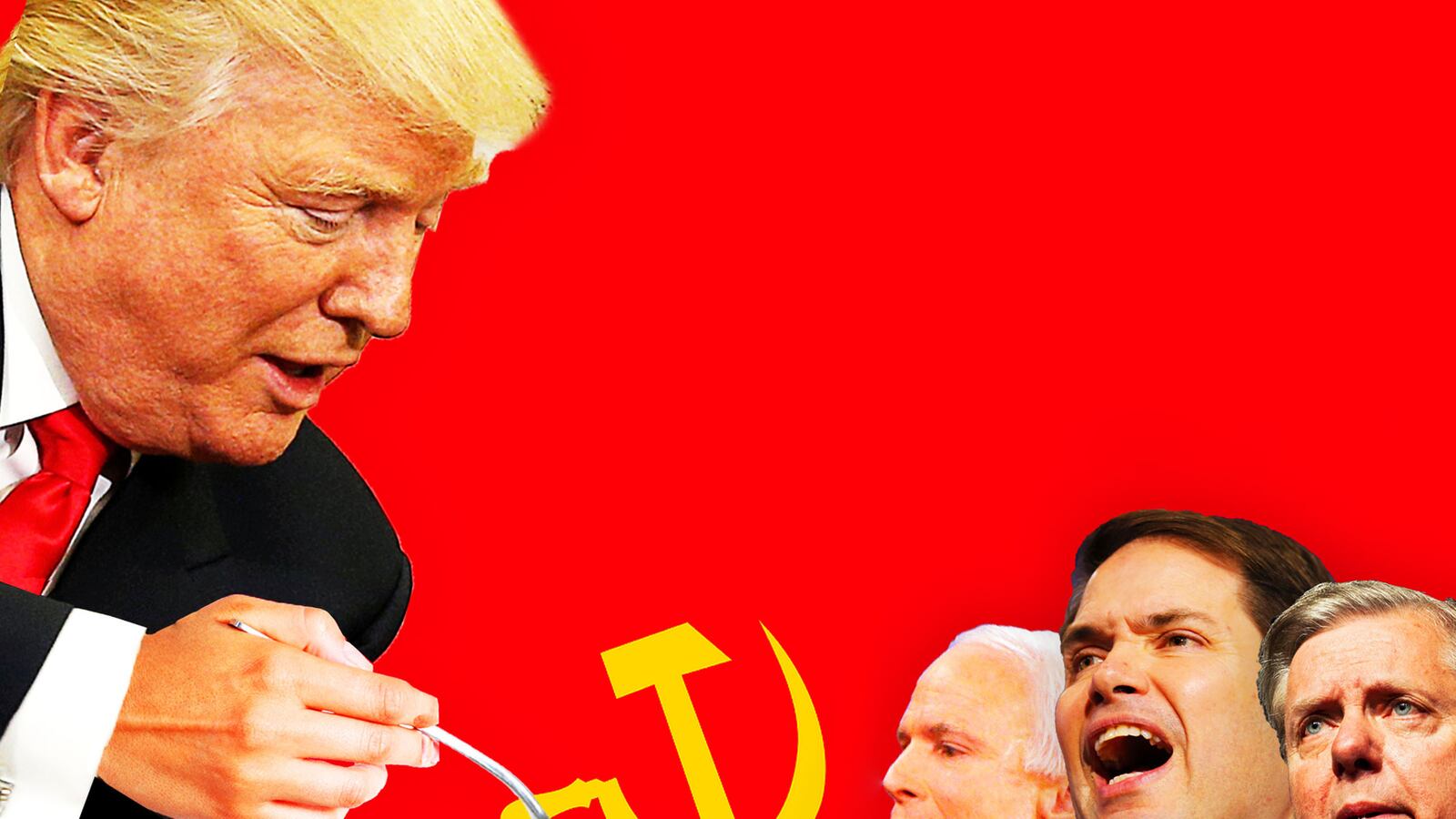Donald Trump’s election was a humiliation for the Republican foreign policy establishment. And with the nomination of Rex Tillerson, the Exxon Mobil CEO with ties to Vladimir Putin, as secretary of State it appears their nightmare is not over.
Tillerson’s selection is driving a wedge between members of the Republican Party’s national security elite, who never wanted Trump as their nominee in the first place, and are alarmed by the CEO’s ties with Putin. And it takes place during a divided time in which lawmakers from both sides of the aisle have called for investigations into malicious Russian interference with the American presidential election—something many Republicans disagree on.
There is incredible pressure for Republicans to fall in line rather than to take on the formidable goal of blocking a cabinet nomination. It’s a rare occurrence: The Senate last rejected the cabinet appointee of an incoming president in 1989, when it voted against President George H.W. Bush’s nomination of John Towers to be secretary of defense.
Still, longtime Republican foreign policy experts said they had reservations about the pick.
“This is not a job for amateurs. Mr. Tillerson appears to be an amateur,” said Daniel Pipes, a George W. Bush administration appointee and the president of the Middle East Forum. “What I do know—especially his warm ties to Vladimir Putin and his apparent complete lack of knowledge about the intricacies of American foreign policy—make me very wary indeed.”
“Rex Tillerson’s ties to Russia through the company he led, Exxon Mobil, give one pause,” said Dr. Peter Mansoor, who served as an executive officer for Gen. David Petraeus. “It is becoming more clear by the day that Russia is playing games with the American political system and is actively working to disrupt U.S. alliances overseas.”
Before Tillerson was officially announced Tuesday morning, Republican senators and foreign policy experts began signaling their deep discomfort with the pick.
After the nomination, Sen. Marco Rubio indicated “serious concerns” about the nomination, while Sen. John McCain said he was worried about Tillerson’s business ties with Putin, whom he called a “butcher, a murderer and a thug,” and Sen. Lindsey Graham added that Tillerson’s opposition to Russian sanctions raise “many questions which must be answered.”
But there is an expectation that Tillerson—though he’ll be asked tough questions on Exxon Mobil, his views on sanctions, and how he’ll conduct America’s relationship with Russia—will ultimately be confirmed unless a new scandal arises or he makes an unforced error.
“While I think the moment is ripe on controversy on the Russia questions, if he can go up to the Hill and answer those questions, he’s going to be just fine,” said Lester Munson, former staff director for the Senate Foreign Relations Committee, which Tillerson’s nomination will pass through. “He’s got a record of accomplishment in the global arena.”
Outside of Congress, even some who had steadfastly opposed Trump during the presidential campaign were rallying behind Tillerson’s nomination. In doing so, they underlined Tillerson’s business experience as a unique positive. The endorsements of former Secretary of State Condoleezza Rice and Secretary of Defense Robert Gates also seemed to encourage Republican foreign policy experts, even though Tillerson's Exxon Mobile is a longtime client of the consultancy firm run by Rice and Gates.
“It is also the case that one of our finest secretaries of State, George Schultz, came into office having headed a major corporation. So there is precedent for this to work out well,” added Peter Feaver, who served on the National Security Council staff at the White House between 2005 and 2007 and had been a Trump critic. “I am impressed by the fact that the Republican party’s two top experts on Russia, Bob Gates and Condi Rice, both endorsed him.”
“Oil and gas companies often must drill in nasty environments—physically and politically. It is tough work. If Mr. Tillerson is as successful in his new role as he was as an oilman, the country will be better for it,” said William Tobey, who worked in nuclear nonproliferation in the George W. Bush administration but had opposed the Trump campaign.
But GOP senators must now either oppose their party’s incoming president or look utterly hypocritical for their longstanding opposition to the Russian government, an awkward position that was immediately pounced upon by Sen. Chris Murphy, a rising star in the Democratic Party on foreign policy issues.
“For years, I’ve listened to my Republican colleagues in the Senate eviscerate President Obama for being too weak on Russia,” Murphy said Tuesday. “No Republican who has called for a tougher line against Russia should ever be taken seriously again if they vote to put a Putin ally at the top of the State Department.”
The GOP has a slim 52-48 margin in the Senate, meaning that just three Republican defections could doom Tillerson’s cabinet nomination.
“It puts Republicans in a really awkward position. You have to ask yourself, as a Republican, do I really want to put a target on my back as someone who is actively working against the administration from day one… or do I give it a pass?” said Julianne Smith, a senior fellow at the Center for a New American Security. “On Russia, of all the issues, there is significant bipartisan concern.”






